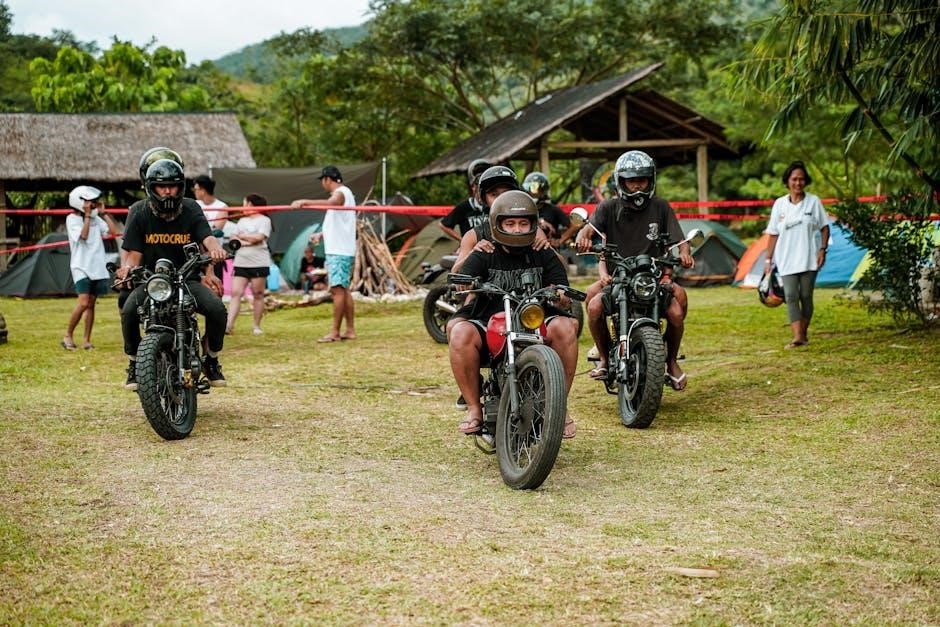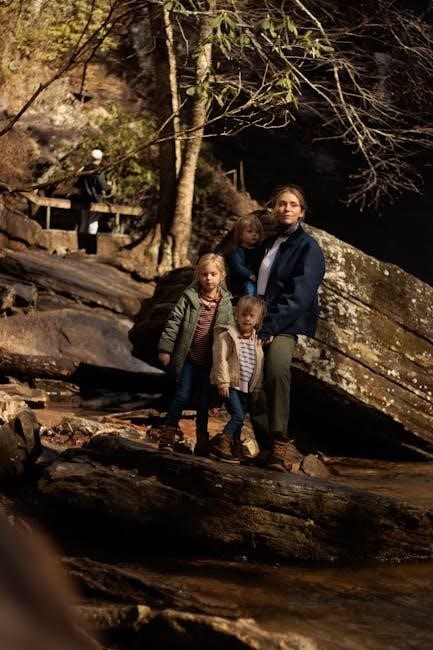Camping Merit Badge Requirements: A Comprehensive Guide
The Camping merit badge challenges Scouts, both mentally and physically, fostering personal fitness. This guide provides a comprehensive overview, including updated 2024 requirements. Utilize merit badge workbooks, available in PDF and DOCX formats, to document your progress effectively. Remember to use resources for camping and personal growth.
Updated 2024 Requirements Overview
The Camping merit badge has updated its requirements for 2024, reflecting a renewed focus on outdoor skills and responsible camping practices. These changes emphasize Leave No Trace principles and personal health and safety considerations. Scouts aiming to earn this badge must adhere to these updated guidelines, ensuring their camping experiences are both educational and environmentally conscious.
Key updates include clarifications on the camping nights requirement, specifying that Scouts must accumulate at least 20 nights at designated Scouting activities or events. A long-term camping experience of up to six consecutive nights can contribute to this requirement. Furthermore, the cooking requirements now mandate preparing specific meals, including a trail meal using a lightweight stove.
The 2024 requirements also highlight the importance of planning and preparation. Scouts need to develop detailed menus, rosters, and personal plans before embarking on their camping adventures. Understanding and adhering to the Outdoor Code is crucial, promoting ethical behavior in the outdoors. Merit badge workbooks in PDF and DOCX formats are available to aid in organizing notes and documenting activities.

The Camping merit badge is an Eagle-required badge that introduces Scouts to the joys and responsibilities of outdoor adventure. This badge equips Scouts with essential camping skills, promoting self-reliance and teamwork. Earning this badge involves a combination of practical camping experience, planning, and knowledge acquisition. Scouts will learn to pitch tents, cook meals outdoors, practice Leave No Trace principles, and understand the importance of personal health and safety.
This merit badge is designed to foster a deep appreciation for the natural world and instill a sense of stewardship. Scouts are encouraged to explore various camping environments, from established campgrounds to backcountry settings. The Camping merit badge also emphasizes the value of preparation, requiring Scouts to plan menus, create rosters, and develop emergency procedures.
By completing the requirements for this badge, Scouts not only gain valuable outdoor skills but also develop important life skills such as problem-solving, leadership, and communication. The Camping merit badge is a stepping stone to further outdoor adventures and a foundation for responsible citizenship.
Camping Nights Requirement: Accumulating 20 Nights
A core component of earning the Camping merit badge is demonstrating practical camping experience. Scouts must accumulate a total of at least 20 nights of camping at designated Scouting activities or events. This requirement emphasizes consistent participation in outdoor adventures and allows Scouts to experience a variety of camping scenarios. Each night spent under the sky or in a tent pitched by the Scout counts toward the total.
These camping nights can be earned through various Scouting events, such as troop campouts, district camporees, summer camps, and high-adventure treks. The key is active involvement and consistent effort to gain practical experience in different outdoor settings. It is imperative to maintain a record of each camping night, documenting the date, location, and type of event for verification by the merit badge counselor.
This requirement encourages Scouts to embrace the outdoors and develop a genuine appreciation for camping. By spending a significant amount of time in nature, Scouts gain valuable skills, build confidence, and foster a lifelong love for outdoor activities.
Long-Term Camping Experience: Up to Six Consecutive Nights
Within the 20-night camping requirement for the Camping merit badge, Scouts must also complete a long-term camping experience. This entails camping for up to six consecutive nights at a designated Scouting activity or event. This extended camping trip provides a deeper immersion into the outdoors, allowing Scouts to refine their skills and build resilience.
This extended experience allows Scouts to fully immerse themselves in the outdoor environment, gaining a more profound understanding of camping skills and self-reliance. During this period, Scouts can refine their tent-pitching abilities, master cooking techniques, and enhance their navigation skills. They can also develop a greater appreciation for nature and learn to live comfortably in the outdoors.
The long-term camping experience provides an opportunity for Scouts to foster teamwork, build camaraderie, and develop leadership skills. Working together to set up camp, prepare meals, and navigate the wilderness fosters a sense of shared responsibility and strengthens bonds among Scouts.
This extended camping experience pushes Scouts beyond their comfort zones, encouraging them to embrace challenges and develop problem-solving skills. By overcoming obstacles and adapting to changing conditions, Scouts build confidence and resilience, qualities that will serve them well throughout their lives.
Cooking Requirements: Meals on the Trail
The Camping merit badge emphasizes practical outdoor skills, notably cooking. Scouts must demonstrate their ability to prepare nutritious and appealing meals while camping, specifically focusing on trail meals. These meals should be planned in advance, considering nutritional needs and the limitations of cooking in the outdoors.
As part of the cooking requirement, Scouts need to cook at least one breakfast, one lunch, and one dinner for their patrol while camping outdoors, selecting meals they previously planned. At least one of these meals should be a trail meal, requiring the use of a lightweight stove. This emphasizes the importance of efficient cooking methods and minimal equipment while on the move.

Scouts are expected to demonstrate proficiency in selecting appropriate ingredients, safely handling food, and preparing meals that provide adequate energy for outdoor activities. They should also be mindful of Leave No Trace principles, ensuring that all food waste is properly disposed of and that the cooking site is left clean.
The cooking requirements of the Camping merit badge teach Scouts valuable life skills, promoting self-sufficiency and responsible meal preparation. By mastering outdoor cooking techniques, Scouts gain confidence in their ability to provide for themselves and others in challenging environments.
Leave No Trace Principles and Outdoor Code
A crucial component of the Camping merit badge involves understanding and practicing the Leave No Trace principles and the Outdoor Code. These guidelines promote responsible outdoor ethics, ensuring the preservation of natural environments for future generations. Scouts must demonstrate a thorough understanding of these principles and their practical application during camping activities.
The Leave No Trace principles encompass seven key areas: plan ahead and prepare, travel and camp on durable surfaces, dispose of waste properly, leave what you find, minimize campfire impacts, respect wildlife, and be considerate of other visitors. Scouts must comprehend each principle and how to implement them effectively in various outdoor settings.
The Outdoor Code complements Leave No Trace by emphasizing respect for the environment and responsible behavior. It encourages Scouts to be clean in their outdoor manners, careful with fire, considerate in the outdoors, and conservation-minded. By adhering to the Outdoor Code, Scouts contribute to the protection and preservation of natural resources.

As part of the merit badge requirements, Scouts are expected to write a personal and group plan for implementing Leave No Trace principles on their next outing, showcasing their understanding and commitment to environmental stewardship. This exercise reinforces the importance of responsible outdoor practices and their positive impact on the environment.
Planning and Preparation: Menus and Rosters
Successful camping hinges on meticulous planning and thorough preparation, vital elements emphasized within the Camping merit badge. This includes crafting detailed menus and organizing comprehensive rosters to ensure a smooth and enjoyable outdoor experience. Scouts learn to anticipate needs, manage resources effectively, and delegate responsibilities for optimal group function.
Menu planning involves creating balanced and nutritious meal plans suitable for the duration of the camping trip. Considerations include dietary restrictions, available cooking equipment, and the weight and portability of food items. Scouts are encouraged to incorporate trail meals requiring lightweight stoves, promoting self-sufficiency and adaptability in diverse environments.
Rosters play a crucial role in organizing tasks and assigning responsibilities among the camping group. These documents outline individual roles, emergency contacts, and specific duties, ensuring accountability and efficient workflow. Rosters also facilitate communication and coordination, particularly in larger groups, enhancing overall safety and preparedness.
Furthermore, planning encompasses campsite selection, activity scheduling, and gear preparation. Scouts learn to assess potential hazards, identify appropriate camping locations, and develop detailed schedules that maximize learning and enjoyment. A well-prepared plan mitigates risks, fosters teamwork, and contributes to a rewarding camping experience, aligning with the core values of Scouting.
Personal Health and Safety Considerations
Prioritizing personal health and safety is paramount when engaging in camping activities, a key focus within the Camping merit badge. Scouts learn to identify potential risks and implement preventive measures to ensure a safe and healthy outdoor experience. This encompasses understanding environmental hazards, practicing proper hygiene, and managing personal well-being.
Scouts must be aware of potential dangers such as weather conditions, wildlife encounters, and terrain challenges. They learn to assess these risks and take appropriate precautions, including dressing appropriately, using insect repellent, and storing food securely. Understanding basic first aid and emergency procedures is crucial for addressing injuries or illnesses that may arise.
Maintaining personal hygiene in the outdoors is essential for preventing the spread of germs and maintaining overall health. Scouts learn proper handwashing techniques, safe water sourcing and purification methods, and appropriate waste disposal practices. They also understand the importance of sun protection and hydration to prevent heat-related illnesses.
Furthermore, Scouts are encouraged to be mindful of their physical and mental well-being during camping trips. This includes pacing themselves during hikes, getting adequate rest, and communicating any concerns to the group leader. By prioritizing personal health and safety, Scouts can minimize risks and enjoy a fulfilling and memorable camping experience, aligning with the principles of responsible outdoor stewardship.
Discussion on Personal Growth and Citizenship
Earning the Camping merit badge extends beyond acquiring outdoor skills; it fosters significant personal growth and cultivates a sense of responsible citizenship. Throughout the process, Scouts reflect on their experiences, analyzing how the challenges overcome and lessons learned contribute to their development as individuals and members of society. This involves thoughtful discussions about personal values, ethical decision-making, and the importance of contributing to the well-being of others.
Camping provides opportunities for Scouts to develop self-reliance, resilience, and problem-solving skills. They learn to work effectively as a team, communicate clearly, and take initiative in challenging situations. By embracing the principles of Leave No Trace, Scouts demonstrate respect for the environment and a commitment to preserving natural resources for future generations.
Furthermore, the Camping merit badge encourages Scouts to consider their role in the broader community. They explore how their actions impact others and how they can contribute to creating a more sustainable and equitable world. This includes understanding the importance of civic engagement, responsible resource management, and promoting inclusivity in outdoor activities.

By engaging in thoughtful discussions about personal growth and citizenship, Scouts gain a deeper understanding of themselves and their place in the world. They develop a strong sense of purpose and a commitment to making a positive difference, embodying the values of the Boy Scouts of America.
Resources: Merit Badge Workbooks (PDF, DOCX)
To aid Scouts in their journey toward earning the Camping merit badge, several valuable resources are available, primarily in the form of merit badge workbooks. These workbooks, typically offered in both PDF and DOCX formats, serve as comprehensive guides to navigate the requirements and track progress effectively. The PDF version ensures universal accessibility, while the DOCX format allows for digital completion and customization.
These resources provide a structured framework for Scouts to organize their notes, actively listen during counseling sessions, and meticulously document their experiences. Workbooks often include checklists, worksheets, and prompts to facilitate thorough preparation and reflection on the camping experiences. They are designed to complement the official Camping merit badge requirements outlined by the Boy Scouts of America.
While workbooks are incredibly helpful, they are not a substitute for direct engagement with the merit badge counselor and hands-on learning. Scouts are encouraged to use these resources to enhance their understanding of the material, but they still need to actively participate in camping activities, demonstrate proficiency in required skills, and engage in meaningful discussions with their counselor.
The availability of these resources underscores the BSA’s commitment to providing accessible and effective tools for Scouts to achieve their goals. Merit badge workbooks empower Scouts to take ownership of their learning and embark on a rewarding journey towards earning the Camping merit badge.

